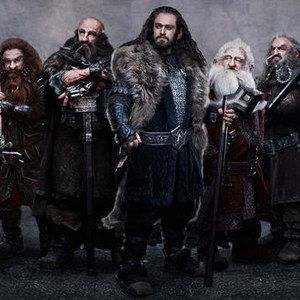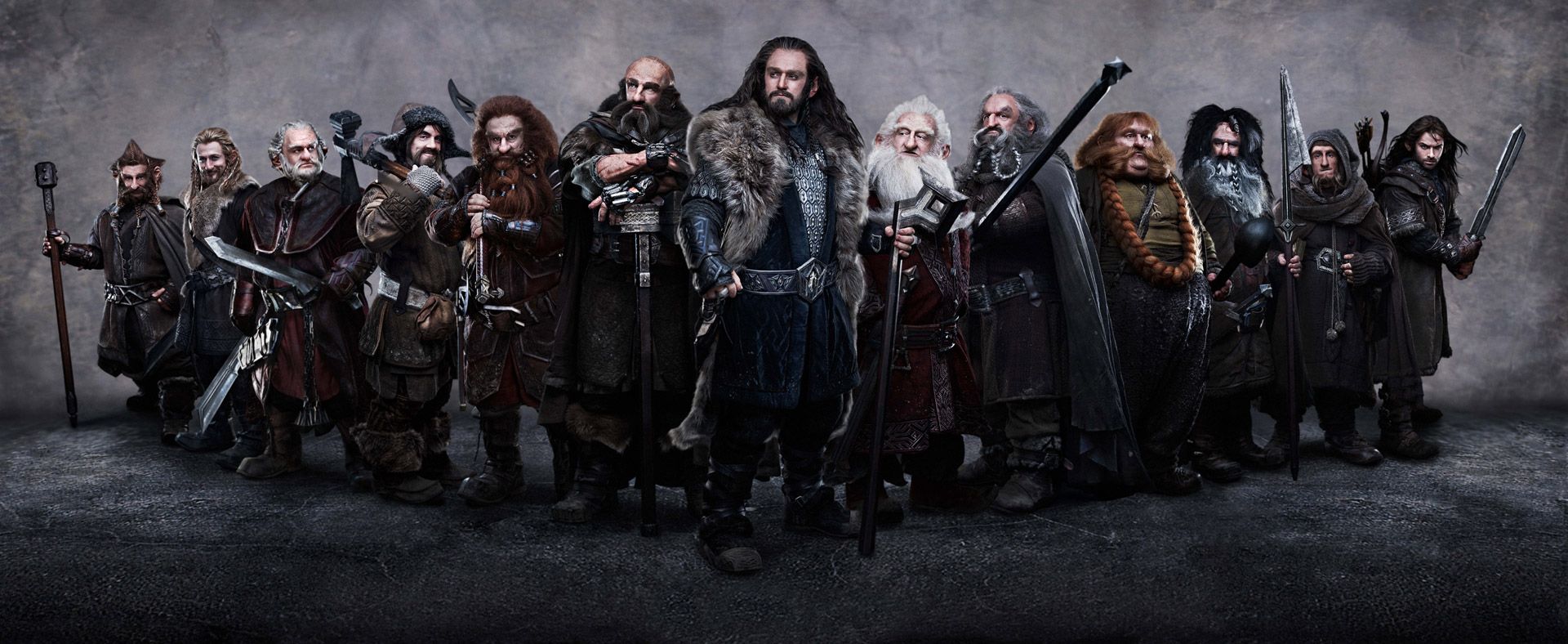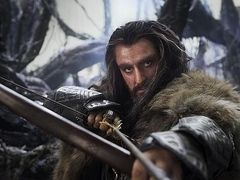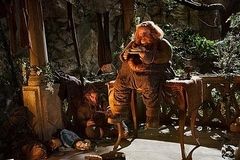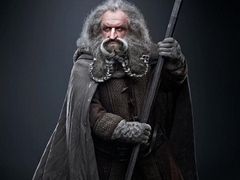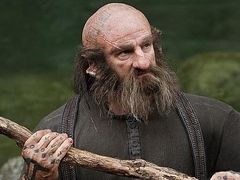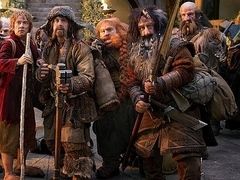The Hobbit: An Unexpected Journey Set Visit Part 1: Getting to Know the Dwarves
We recently traversed the globe to visit the set of Peter Jackson's The Hobbit: An Unexpected Journey, one of (if not the) most anticipated films of the holiday movie going season. While spending time in Middle Earth (aka New Zealand), we saw many exciting and wonderful things, a lot of which we can't tell you about until the second movie comes out next year.
What we can share with you is an introduction to the band of Dwarves that accompany Bilbo Baggins (Martin Freeman) on his journey to retrieve a treasure of gold from the dragon Smaug, helping the dwarves to reclaim Lonely Mountain. There are thirteen dwarves in all, and it may be a little hard for the average person to keep them all straight.
Speaking from the Wellington set, we first caught up with Richard Armitage, who plays Thorin Oakenshield, the heartthrob of the group. Thorin is a proud, pompous leader of this diminutive army, and the heir to the demolished dwarven kingdom under Lonely Mountain.
Richard Armitage describes the character in his own words, focusing on both his character's height, and his own.
"The real height of Thorin is five-foot-two, so actually he's not really that short. I think most five-foot-two people would be quite offended if they were to be called dwarves. But why would they want a six-foot-two actor to play a dwarf? Even through the early days of rehearsal and shooting, I didn't really unpack my bag for about three weeks, 'cause I thought that I was going to be on the plane going home. But yeah, it's worked out all right.
They put lifts in my shoes because they wanted Thorin to be half an inch taller than Dwalin, so actually they made me slightly taller. But what's really crazy about it is that when you've got all the gear on, the padding, the costume, you feel bigger than your real self, so mentally, I've been walking around for the last year as a bigger version of -- It's like a giant version of yourself, and then they shrink it down. But it's not until you see it shrunk down that you think, actually -- Yeah, it's just a connection that you make in your head, 'cause you're bigger than everyone, and heavier. But I think that's not a bad thing, that we haven't been playing small people.
When you see the way that they've got their kingdoms, they have this inflated -- They're compensated for the fact that they are a secret forbidden race that were nearly destroyed. And the Elves have their privileged existence, this almost spiritual existence, and the dwarves have to really fight for their place. And so they do it by aggrandizing their environment. So that's been interesting."
"I think knowing that his father and his grandfather have been touched by this dragon sickness, which doesn't necessarily affect all dwarves, but some dwarves are susceptible to it. It's this attraction to gold which becomes their downfall...It has always been at the back of his mind. And I think the burden of taking his people back to their homeland, which is so massive, makes him a lonely figure, I think. Knowing that his grandfather failed, and his father failed, so if he doesn't do it, there's no other member of his line that will ever do this. So he will continue through history as the king that failed to achieve the potential for his people. That's something, again, which is a huge burden to carry. And I think that's what drives him, but it's also the thing that he fears, that he will fail. And there's many opportunities for him to fail on this quest. We haven't really got into the mountain yet, and had to play around with the dragon sickness, but I think it's going to be very interesting. I've looked at all sorts of different -- I've looked at drug addiction, and things along those lines, so that it actually has a physical effect on him, his mind and his body. But I think because he's been a very heavy, melancholic character, I think the gold is going to change that, and it's going to sort of bring him to life and make him the king that he should be, and more vibrant. But it comes at a price, I think."
Are their parallels between Frodo's journey in The Lord of the Rings: Fellowship of the Ring and Thorin's journey in The Hobbit: An Unexpected Journey?
"I hadn't thought about that. I suppose, yeah, I think there is a parallel there. I think there's also parallels with -- There's a few characters in Rings that are disenfranchised and are trying to reclaim what is rightfully theirs. Maybe Thorin is a little bit more mercenary about that. The Arkenstone is certainly something which he covets and craves. And he knows that, without that gem, he can never truly be king. So that takes on a real significance, like a talisman that he obsesses over in a similar way to the Ring. But he doesn't really carry that through the story with him, it's just something that he's going towards. But, yeah, there have been moments of taking him out of the present, sort of projecting his mind into the future, but also into the past, because of the trauma of the dragon coming to the mountain, he carries that with him as well. And there aren't many on the quest that have seen Erebor, and experienced that holocaust that happened. So he has all of this inside of him."
In what may have been an odd circumstance for the actor, he was allowed to watch the first trailer for the movie while still deep into playing the character. His reaction to seeing the footage for the first time?
"My reaction? I only saw it about two days ago, 'cause I was about to go do some ADR, and I haven't really seen anything. And I want to re-record it actually, because I feel differently about the character now than I did at the beginning. It's weird, Bag End was the first week of shooting for this character, for me and for the other dwarves as well, and it feels so different. But it was good that it felt awkward. It felt like they were out of place, because they are in that environment. Dwarves don't belong in a cozy, domestic situation. They belong in giant halls and on a battlefield. And so, to be in a kind of cottage-y, strange place, it was all very useful, the aggravation at being brought here to take this little strange person on a quest, which is monumental to them. This little fellow that he's being forced to take on board is such a big frustration. So that was my experience of Bag End."
In expanding this new trilogy into three films, the original source material needed to be fleshed out. Richard Armitage spoke about the additions to the story, and how they are culled from the works of J.R.R. Tolkien.
"They've used a lot of the appendix in The Lord of the Rings. I think there's two versions of this chance meeting between Thorin and Gandalf, which happens prior to this story, which I've certainly used. We've discussed The Hobbi, and why we need to take Bilbo on this journey. But in terms of this story, it does unfold as we go along that we need a Hobbit to go in to try and find the Arkenstone. Because the dragon will not recognize the smell of a Hobbit, whereas he knows very well the smell of a dwarf. And there's a possibility that they may be lighter on their feet, and more able to get in there. But it's kind of a loose project for Thorin to accept, I don't think he's ever bought that. I think he needs Gandalf to go on the quest, and if Gandalf says they've got to take this Hobbit, then fair enough. 'Cause he can't really do it without him, because Gandalf has the map and the key, and he's kind of hoodwinked into doing it. But all the way along, there is this antagonistic relationship between Thorin and Gandalf. I think Thorin is trying to prove that Gandalf isn't correct, and most of his assumption is that he's trying to usurp his leadership. When Gandalf isn't there, Thorin really becomes a leader, and when he turns up, he has to be subservient, and it's not something that he likes at all."
"Thorin's point of view, I think he's thinking less about the gold and more about his people and his own personal agenda with his grandfather, his father, and his nemesis Azog who slaughtered his grandfather. And also the dragon Smaug, he has this personal relationship with Smaug who came and -- I've used Hiroshima, actually, as an inspiration for that kind of devastation that drove them away from their homeland. So yeah, that's been Thorin's driving force."
Can we expect any humor in the movie?
"Yeah, there is a lot of humor. Dwarves are quite strange little creatures. They're rude, greedy. I've looked for Thorin's humor, it's quite hard to find. He doesn't have a lot to laugh about. But it's all about the camaraderie. The only place where they're ever truly relaxed is in Bag End, before the quest starts. And as soon as it starts, there really haven't been many moments of relaxation where they can kick back and have a laugh. But yeah, they manage to find these extraordinary circumstances where there is this sparkle of humor. Dwalin and Thorin are kind of best buddies, and there's a sense of camaraderie between them. And on the battlefield, they back each other up, and there's this one-upmanship in terms of their fight skill. So yeah, humor plays a lot into it, but not necessarily for my character."
What about the 'holy shit' moments this franchise has come to be known for?
"Yeah, I'm sure there are going to be. There's a couple of -- I think it's mainly fight moments, I don't quite know what Peter Jackson's got in store for- - We've sprinted through flames. They set fire to K-Stage, and I did a slow motion sprint through the forest, which was on fire. And they were dousing the stunt guy with the flame retardant gel. And then he stood and watched me do it, at which I had a 'holy shit' moment. I was like, "You're not going to put any of that on me." But that was kind of cool. I'm just trying to think -- I guess when the dwarves emerge from the mountain in their armor, that's kind of -- You're talking stunts, aren't you?
Yeah, I don't know yet.
I think I put a shield through my lip and I smashed the shield in and had a mouthful of blood and this big, huge broken lip, and Peter Jackson said, "Okay, can you just try another one now?" I'm like, "Yeah, okay", with this big mouthful of blood. But it looks great on the shot, because I've got this sort of bleeding teeth and it's dripping out of my face.
That's, maybe, a 'holy shit' moment, swallowing my own teeth."
"Dwalin is the veteran warrior of the group. He's the one along with Balin and Thorin that have seen what the dragon has done. They've experienced battle, whereas a lot of the other guys, I think this is the first time for them. They've not really had that sort of life, and when we talked about it, when we started the job, it's a bit like somebody who is going into combat for the first time, I suppose. The young ones are very enthusiastic and think it's going to be a great adventure, but the older ones realize that it's going to be something a lot more harrowing, and I think that's where Dwalin is coming from. And he's there, I think, for a very specific purpose. Which is to regain the honor of the Dwarvish race. It's not so much for the gold or the money, it's to get back our homeland. It's very much a returning to an occupied territory almost, and getting it back. I hit a lot of people and I'm very violent. That's the shorthand."
The actor explained the elaborate and detailed tattoos that cover Dwalin's body.
"We decided early on that Dwalin would have tattoos both on my head and on my arms. We've shot the pre-sequence with Moria , where the younger version of myself doesn't have any of those things. The tattoos, I believe, are an illustrated history of our people. With what happened to us at Moria and with Erebor, etcetera. It's a permanent reminder to me of what we need to do and what we've lost. That's how I interpret the tattoos. There were lots of suggestions as to literally what they meant, but we went with that. And similarly with the axes. I have two axes that I strap to my back, and I wanted very much to have them as characters in the story, almost. I remember that Emily Bronte had two dogs, hounds, called Grasper and Keeper, and I'd never forgotten that. And I thought that they would be great names for Dwalin's axes. That he grasps your soul with one axe and keeps it with the other. And when I suggested it to Peter Jackson -- I literally suggested it as a character note, rather than something that I wanted, he went, "Oh yeah, that would be great! Oh, yeah, we could get it in Elvish and the fans will love that!" So, there they are, literally the next day they appeared."
Graham McTavish also explained his character's overall look in the film, as compared to what he took the character to be in the books.
"Right from the beginning, even before I got here, I was very keen that he was bald, and Peter Jackson went along with that. I think they liked that distinction in the group. Physically it's important that we're distinguishable from each other as well as in character terms, and that was something that I was very keen on. And then when we had the prosthetic tests, it was a fascinating process to see the tiny adjustments that they would make. They'd do a camera test and then -- My nose is, believe it or not, actually smaller than it was. A little bit. I had more scars than I have now. They decided to take some of those scars away. I looked at some of the concept art the other day, and in one of them I had an eye patch, and a whole head of hair. I think Richard Taylor was saying for my beard alone, they did eight hundred and nineteen separate drawings."
What is Dwalin's relationship with Bilbo like?
"Dwalin is the type of man, or sorry, dwarf who doesn't trust people easily. He's very black and white in his views, so that you're either somebody who has his undivided loyalty or you're potentially an enemy. And until you prove that you're not an enemy, you are assumed to be so, and I think that's his attitude towards Bilbo. I don't think it was my idea to take him along for sure. And I don't think I'm happy about it once it's decided. I know Thorin isn't and I tend to take my lead from Thorin as a character. We grew up together, we've known each other all our lives, and I'm the last one in the story to find my loyalty tested with regards to Thorin. So with his attitude to Bilbo I follow them. But working with Martin Freeman it's great. It's lovely and we all have a very nice interesting piss taking relationship. All of us, me and him."
Graham McTavish went onto describe an out of body experience he had on the set.
"I remember all of us as actors, it would have been the first day that we were on set and Ian McKellen appeared in the full rig and that was quite an out of body experience in Bag End, because you did feel like you'd stepped into a film, or another world that you were familiar with, and then suddenly you were actually inhabiting at the same time and that was quite a trippy moment."
"Bombur is actually quite scared of Dwalin. Quite intimidated. Bombur's different because like Bofur, my brother, and Bifur, my cousin, we're not from the line of Durin. We're sort of more simple folk. Peasants, as he'd like to say. Farmers, so to us it still means quite a lot to go and take over the mountain, but we're just going along for the ride. I'm quite naïve in a way as to what to expect. Don't mind a good scrap, but my brother or cousin will be in there fighting all the way if we need to, but probably don't have that real deep attachment to that royalty and to the gold that the others have. I go along with everything, but it's a bit of an eye-opener for Bombur. And obviously he eats, falls over a bit. Cooks, he does cook."
Bombur's look came together rather quickly, explains the actor.
"I walked in and [they're] like, "Yeah, cool." Fat guy, ginger, great big thing around his neck. I like the ginger. I was a ginger when I was a child and my little daughter is very ginger. The little dome. I kind of like it. The only thing we talked about was having the herbs, a little bag of them. My ladle obviously, and I'll be cooking something."
How did Bombur react to Bilbo?
"I quite like Bilbo, I quite like supporting the little guy and I give him a go. It's pretty easy going. And Martin, he's very cool, isn't he? He's got great dress sense. I just buy black t-shirts, I can't compete with him."
"I think because, as an actor, I'm ten years older than the next person down the list, they thought I should be, while still a warrior, somebody who might be a little more considerate. It's what you call typecasting.
Oin is meant to be something of an apothecary. And, it won't be part of the film, but I did do some research about them, and in the olden days, they also acted as what we today call midwives. So we thought Oin and Gloin -- Gloin is the father of Gimli, and we decided that probably, I was assisting at the birth of Gimli, and he turned out the way he did because I dropped him on his head. Something like that, for instance.
Oin and Gloin don't appear frightfully much in the book. And what's wonderful about this production is that we've all had an opportunity to make an input into certain things. One of the things I do is carry around a satchel, which is full of little lotions and potions and things like that. So if somebody is sick, I'm meant to be the one who steps in to look after them."
"Bifur? It's a fantastic opportunity for an actor. When this came out, when I first saw it, in about a second, I thought, "Well, that's a bit strange." Then I thought, "No, that is fantastic!" Because Bifur is slightly intellectually challenged, because this is an Orc axe. And so his personal journey on it, is I'm looking for the guy that did this, and I'm still hoping to find him. But Bifur, at the start of the journey is quite zoned out. He is actually -- This has an effect on his brain. And he has what is-- It's sort of a version of foreign language syndrome coming from frontal lobe trauma, which is like having a stroke. And he can only speak in Dwarvish. Which is great, because it's a whole -- The production has somebody that has written Dwarvish, off in the U.K., and so every now and then I get to throw it in. It's a really good thing for the fans, it's a really good thing for the story, because it is an ancient language.
That's part of the story. But Bifur's also a toy maker, so he's actually quite a gentle character, but he's insanely violent as well. Which is part of the reason I'm here. It's because I may be a bit of a burden, but I'm very handy in a fight. He's a bit of a maniac in a fight, and he can't stop, and he uses his fists a lot. And as John said, what's been great is to all have an opportunity, right from the start, to give input and to flesh out the characters and make the dwarves, give them all living, breathing, different beings. And the picture has really-- Because you have to, in the picture. You can't just have a bunch of guys. You've actually got to have an emotional attachment to them, either hate them or love them or something. That makes them all a little bit different and a little bit special."
Stay tuned for more from the set of The Hobbit: An Unexpected Journey, as we speak with Ian McKellen, Martin Freeman, Andy Serkis, and director Peter Jackson.

